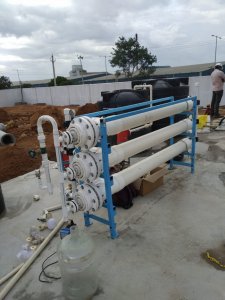Membrane Bio - Reactor (MBR)
Net-Zero Impact

Net-Zero Claims
- Saves water
- Prevents underground watertable contamination
- Locally sourced product
Description
Membrane bioreactor (MBR) is the combination of a membrane process like microfiltration or ultrafiltration with a biological wastewater treatment process, the activated sludge process. It is now widely used for municipal and industrial wastewater treatment.
When used with domestic wastewater, MBR processes can produce effluent of high quality enough to be discharged to coastal, surface or brackish waterways or to be reclaimed for urban irrigation. Other advantages of MBRs over conventional processes include small footprint, easy retrofit and upgrade of old waste-water treatment plants.
It is possible to operate MBR processes at higher mixed liquor suspended solids (MLSS) concentrations compared to conventional settlement separation systems, thus reducing the reactor volume to achieve the same loading rate.
Two MBR configurations exist: internal/submerged, where the membranes are immersed in and integral to the biological reactor; and external/side-stream, where membranes are a separate unit process requiring an intermediate pumping step.
Membrane bio-reactors can be used to reduce the footprint of an activated sludge sewage treatment system by removing some of the liquid component of the mixed liquor. This leaves a concentrated waste product that is then treated using the activated sludge process.
Client feedback







No comments found for this product. Be the first to comment!